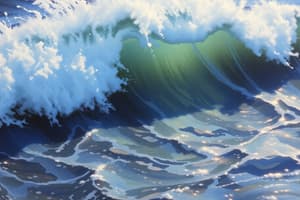Podcast
Questions and Answers
What is a standing wave?
What is a standing wave?
A pair of superimposed periodic waves traveling in opposite directions
How are waves often described?
How are waves often described?
By a wave equation (standing wave field of two opposite waves) or a one-way wave equation for single wave propagation in a defined direction
What is a mechanical wave?
What is a mechanical wave?
A local deformation (strain) in some physical medium that propagates from particle to particle by creating local stresses
Give an example of a mechanical wave.
Give an example of a mechanical wave.
What sustains the propagation of electromagnetic waves?
What sustains the propagation of electromagnetic waves?
Flashcards are hidden until you start studying
Study Notes
Standing Waves
- A standing wave is a wave that remains stationary and is characterized by nodes (points of no displacement) and antinodes (points of maximum displacement).
- Standing waves are formed by the interference of two traveling waves moving in opposite directions.
Wave Descriptions
- Waves are often described by their properties, including wavelength (distance between consecutive crests), frequency (number of crests passing a point per second), and amplitude (height of the wave).
- Wave motion can be categorized based on how they transmit energy, leading to classifications like mechanical waves and electromagnetic waves.
Mechanical Waves
- Mechanical waves are disturbances that require a medium (solid, liquid, or gas) to travel through.
- They are generated by the oscillation of particles in the medium, transmitting energy from one location to another.
Examples of Mechanical Waves
- Sound waves are a common example of mechanical waves, as they travel through air, liquids, or solids by compressing and rarefying the medium's particles.
- Other examples include water waves and seismic waves that travel through the Earth during an earthquake.
Propagation of Electromagnetic Waves
- The propagation of electromagnetic waves does not require a physical medium; they can travel through a vacuum, such as space.
- Electromagnetic waves are sustained by oscillating electric and magnetic fields that produce energy transmission through the propagation of the wave.
Studying That Suits You
Use AI to generate personalized quizzes and flashcards to suit your learning preferences.




